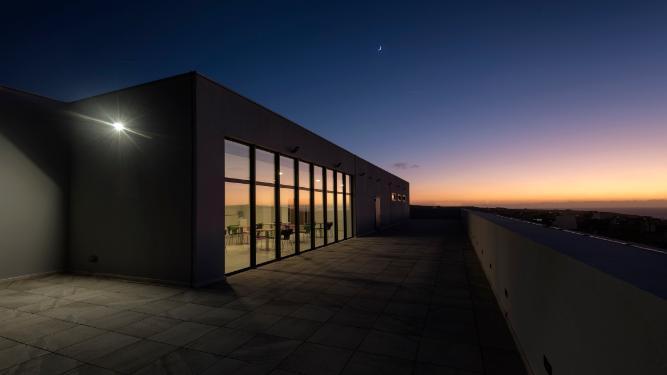Queen Mary, Malta - Why Malta?
At Queen Mary, we are very much aware that we are part of a global society, one bearing both challenges as well as opportunities.
.jpg) Our Malta Campus is proof of our determination to be at the forefront of medical education. Malta, like the UK, has a proud history of expert healthcare, continuing through to the present day.
Our Malta Campus is proof of our determination to be at the forefront of medical education. Malta, like the UK, has a proud history of expert healthcare, continuing through to the present day.
Our Queen Mary, Malta Campus has the honour of being the first ever medical school located on Gozo.
Why Malta?
As a former British colony and an active Commonwealth member country, Malta continues to hold deep and historic links to the UK, at multiple levels. The island is completely bilingual with both English and Maltese holding official status. It also enjoys excellent communication links to Europe.
This, together with the country’s long history of medical systems and healthcare excellence (ranked fifth in the World Health Organisation’s ranking of world health systems), made Malta an optimal choice for Queen Mary’s global growth.
The country’s current drive to upgrade and expand medical care falls in line with our University’s priorities and we are proud to be part of this change.
The building of the Queen Mary, Malta Campus was managed by Steward Healthcare and completed in October 2019. Staff and students moved from our former home of two years at the Sir M.A. Refalo 6th Form College into the new Queen Mary, Malta campus on 26 October 2019. The state-of-the-art campus is situated on the grounds of Gozo General Hospital and features access to a 21st century Anatomy Centre.
Development of the Maltese Health System
The World Health Organisation (WHO) ranks Malta fifth in the world in terms of health system performance.
| Total Population (2019) | 493,600 |
| Gross National Income per capita (US $, 2018) | 26,480 |
| Life expectancy at birth (2016) | m.80 f.83 |
| Probability of dying under five (per 1000 live births, 2018) | 7 |
| Probability of dying between 15 and 60 years (per 1000 population, 2016) | m.71 f.38 |
| Total expenditure on health per capita (Intl $, 2014) | 3072 |
| Total expenditure on health as % of GDP (2014) | 9.8 |
Sources: World Health Organisation; Eurostat
Nurse of the Mediterranean
Geopolitical developments in Europe and the Mediterranean region often placed Malta in the midst of all activity. Ripple effects from battles fought on other shores soon reached Malta, sometimes vehemently; other times in the form of shiploads of wounded soldiers seeking respite and recovery from the pain of war.
The Battle of Gallipoli in 1915 morphed Malta into an island hospital. In the space of a year, Malta went from having four military hospitals to over 30 medical establishments. With over 136,000 wounded soldiers cared for, it is no wonder the island earned the reputation of ‘Nurse of the Mediterranean’.
Maltese Healthcare today
.jpg) Malta has the highest population density in Europe and has experienced significant population growth in recent years that also led to developments in health care provision. Current life expectancy stands at 79.6 years for men and 83.3 years for women, with expectations for increase. This, coupled with a low birth rate, means that Malta’s population is rapidly ageing. Chronic conditions associated with obesity, unhealthy lifestyles and age-associated frailty are the health sector’s major challenges.
Malta has the highest population density in Europe and has experienced significant population growth in recent years that also led to developments in health care provision. Current life expectancy stands at 79.6 years for men and 83.3 years for women, with expectations for increase. This, coupled with a low birth rate, means that Malta’s population is rapidly ageing. Chronic conditions associated with obesity, unhealthy lifestyles and age-associated frailty are the health sector’s major challenges.
The Ministry for Health is responsible for the provision of health services, regulations and standards, and the provision of occupational health and safety. The public health care system remains the key provider of health services, with a strong private sector complementing the provision of health services.
Recent years have seen a move towards the introduction of private-public partnerships within a number of hospitals and primary health care services. The Catholic Church, too, plays an important role in healthcare, specifically in the provision of nursing homes for older people, homes for people with a disability, and for those with mental disorders.
Several associations have been set up for health professional groups. These include the Malta Union of Midwives and Nurses, the Medical Association of Malta, the Dental Association, the Chamber of Pharmacists, the Nursing Association of Malta, the Malta Association of Physiotherapists, the Malta College of Family Doctors and the Midwifery Association.
Public health strategies are built on projected population needs based on available epidemiological information. However, service planning is limited by available financing as well as human resources. To address the latter insufficiency, particularly in terms of nurse-availability, foreign recruitment is often undertaken.
-525x350.jpg)

